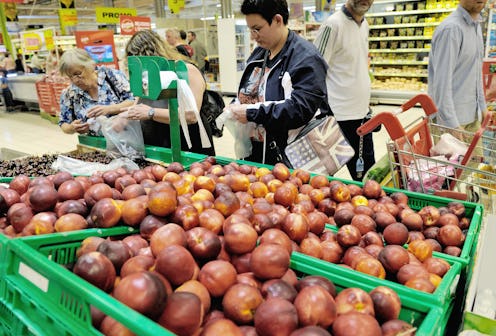News
French Supermarkets Must Donate Unsold Food
The French national assembly voted unanimously on Friday to crack down on food waste by passing a measure which would force supermarkets to donate any unsold food to charity. The new law would also make it a crime to purposely spoil food in order to make it unfit for human consumption — a common practice in the industry that has prompted backlash from those who point out the widening gap between the wealth of supermarket chain owners and the poor who cannot afford to purchase food outright. On Friday, deputy Food Minister Guillaume Garot spoke out against the disturbing practice in light of the new law which he had spearheaded.
"It's scandalous to see bleach being poured into supermarket dustbins along with edible foods," said Garot in a statement to the press. In prior years, many low-income residents who could not afford groceries had made a habit of feeding their families on produce and other food items that had been recently tossed out in supermarket dumpsters, but when market owners became aware of the habit, they began purposely destroying the unsold goods, many of which had not yet gone bad.
In a 2012 report by the Food and Drug Administration, U.S. officials revealed that while many food manufacturers mark their items with "Use-by" dates, those often suggest the range in which the food is at its best quality, rather than standing in as an explicit expiration date. Those foods whose "Use-by" dates have passed are then tossed out despite still being edible.
According to the new measure, supermarkets over 400 square meters (4,305 square feet) would be required to establish food disbursal contracts with local charities by July 2016. If owners decline to abide by the new law, they could be fined up to €75,000 (around $83,000 USD) and spend up to two years in jail.
Environment Ministry officials have called the new measure a win in the fight against excessive food waste, which they say accounts for millions of pounds in squandered items every year.
"There's an absolute urgency — charities are desperate for food," said Assembly deputy Yves Jégo in a statement to the parliament this week. "The most moving part of this law is that it opens us up to others who are suffering."
At present, the number of individuals living below the poverty line in France tops 8.7 million — around 14 percent of the population, according to social policy research group COMPAS at the University of Oxford. In some cities, like Roubaix in the North, the poverty level is nearly 50 percent. With much of the wasted food being thrown into open landfills where destructive procedures emit a variety of harmful greenhouse gases, French legislators point to the depressing state of the millions of impoverished who must stand by and hungrily watch edible foods be burned.
The measure's detractors, however, say that the comparatively hapless law would not do enough to solve the overall hunger problem. French activist group Les Gars’pilleurs has urged lawmakers to reconsider the wasteful practice of over-production in the food industry, which ultimately results in the millions of pounds of food being dumped into landfills later on.
"This law would indeed have no influence on the problem of overproduction of food and upstream of distribution waste," wrote the group in a statement back in February. "[It gives] the false — and even dangerous — impression of a 'miracle cure'."
The measure is set to head to the lower parliamentary house on May 26, after which it will be voted on in the French Senate if successful.
Images: Getty Images (1)
